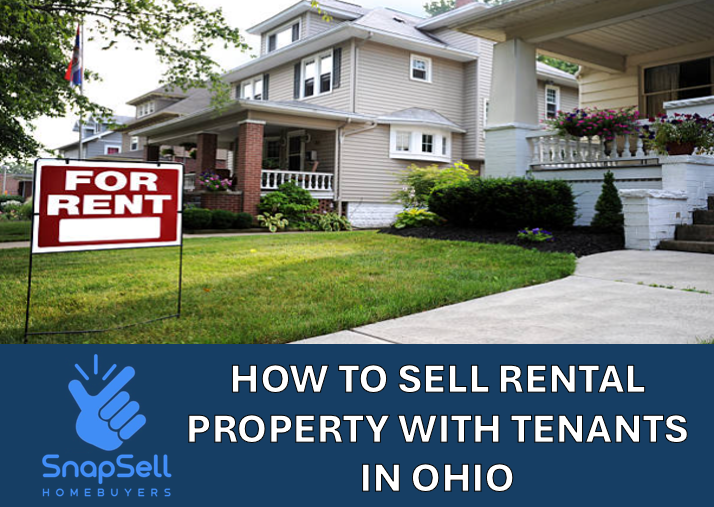
Selling a rental property in Ohio comes with extra steps when tenants are still living in the home. As the owner, you must follow state tenant laws, respect lease terms, and prepare for tax considerations. Whether you plan to sell to another landlord, list the property on the open market, or offer a lease option to tenants, it’s important to balance your rights with the tenant’s.
Understanding Tenant Rights in Ohio
When you sell a rental property, the rights of the tenants don’t just disappear. Ohio tenant laws make clear that a lease or rental agreement stays in effect after the sale. The buyer takes over the obligations of the landlord.
Lease Types and Tenant Protections
Fixed-Term Lease: If a tenant has a residential lease agreement with a set end date, they have the right to stay until the lease expires, even if the property changes ownership.
Month-to-Month Lease: Tenants on a month-to-month rental agreement can be asked to move with a 30-day property notice, provided the landlord follows state rules.
Tenant’s Right to Quiet Enjoyment
Ohio law protects tenants’ right to live peacefully in the property. A landlord or realtor must schedule showings with notice and cannot disrupt daily life.
Eviction Laws
If a tenant refuses to leave at the end of a lease, you must follow the full eviction process. That includes providing an Ohio eviction notice before filing in court. You cannot remove tenants yourself or shut off utilities. Doing so could result in legal action against you.
Key Reasons To Sell Your Rental Homes In Ohio
Rental homeowners in Ohio sell for many reasons. Some may want to cash in on their equity, while others just want to retire from being a landlord.
If you’re a landlord in Ohio, let’s take a look at some of the reasons why you should consider selling your property:
Market Conditions
When Ohio home values rise due to a hot market, cashing in on your equity can outweigh the benefits of ongoing rental income.
Shifting Investment Goals
You may want to move from residential real estate to commercial real estate, or move money out of real estate to put into crypto or the stock market. Selling frees up capital for other opportunities.
Repairing Your Rental Costs Too Much
A rental property that needs frequent or major repairs can quickly turn from an asset into a burden. Replacing a roof, fixing plumbing problems, or upgrading an outdated heating system can cost thousands of dollars. Even smaller repairs, when they happen often, can eat into rental income and leave little profit behind. Some owners decide that the time, money, and effort required to keep up with constant maintenance is no longer worth it. Selling the property allows them to avoid future repair bills and move their money into something that requires less upkeep.
Tired of Tenants
Some landlords choose to sell their rental because they no longer want to deal with tenants. Managing renters can bring stress, especially when there are late payments, constant complaints, or lease violations. Even responsible tenants still require time and attention for repairs, questions, and lease renewals. Over time, this responsibility can become draining and take away from other priorities. Selling the property gives the owner a way to step away from tenant management and focus on investments or activities that better fit their goals.
Decide How You Want to Sell Your Rental Property
Before putting your rental property in Ohio on the market, you need to choose the best way to sell it. Here are the main options:
For Sale by Owner (FSBO)
You handle the entire process yourself, including listing, marketing, and paperwork. This option saves on agent commissions but requires time and effort.
Through a Real Estate Agent
An agent can connect you with qualified buyers and guide you through the sale. Keep in mind you’ll pay commission fees and may need to cover renovation and other selling costs.
To a Real Estate Investor
Selling to an investor or cash buyer like Snap Sell Homebuyers allows for a fast, hassle-free sale without repairs. The tradeoff is usually accepting a lower purchase price.
To Your Tenant
If you have a long-term tenant, they may be interested in buying the property. This could be through a direct sale or seller financing. Another option is to offer tenants a lease option to own the property. This gives them the chance to buy the home after renting. A written lease option agreement must clearly state terms to prevent disputes.
Tax Considerations When Selling Rental Property in Ohio
Taxes affect your net profit when selling a rental. Ohio landlords must consider both federal and state rules.
Depreciation Recapture Tax
When you sell a rental property in Ohio, you may be required to pay depreciation recapture tax. This tax applies because the IRS allows property owners to claim depreciation deductions each year to reduce taxable rental income. When the property is sold, however, the government “recaptures” those deductions by taxing the amount of depreciation you claimed, or could have claimed, at a rate of up to 25%. This is separate from capital gains tax and can significantly affect your net profit from the sale. Since depreciation recapture is a federal tax, it applies regardless of Ohio’s state tax laws, and many sellers choose to consult a tax professional to calculate their exact liability and plan ahead for the impact.
Capital Gains Tax
In Ohio, capital gains are taxed as regular income. The state does not have a separate capital gains tax. This means any profit you make from selling property, stocks, or other investments is added to your other income and taxed at your Ohio income tax rate, which can go up to about 3.5 percent.
At the federal level, capital gains are taxed differently depending on how long you held the asset. The following rates and brackets are accurate for assets sold in 2025:
| Tax rate | Single | Married filing jointly | Married filing separately | Head of household |
|---|---|---|---|---|
| 0% | $0 to $48,350 | $0 to $96,700 | $0 to $48,350 | $0 to $64,750 |
| 15% | $48,351 to $533,400 | $96,701 to $600,050 | $48,350 to $300,000 | $64,751 to $566,700 |
| 20% | $533,401 or more | $600,051 or more | $300,001 or more | $566,701 or more |
How To Prevent a Tax Hit When Selling Your Ohio Rental Property
Taxes can take a significant portion of your profits after a sale. Fortunately, there are strategies to minimize or avoid tax liability when selling a rental property in Ohio.
Utilize Section 1031: Tax Deferred Exchange
A 1031 exchange is a way for property owners to defer paying capital gains taxes when they sell one investment property and buy another. The rule comes from Section 1031 of the Internal Revenue Code. It allows you to reinvest the proceeds from a sale into a “like-kind” property without paying taxes right away. The tax is not eliminated, but it is delayed until you eventually sell the new property without doing another exchange.
To qualify for a 1031 exchange, both properties must be used for business or investment purposes. You cannot use this for a personal residence. The properties do not have to be identical, but they must be of the same nature or character. For example, you can exchange one rental property for another rental, or an office building for a warehouse.
The process has strict timing rules. After selling your property, you have 45 days to identify potential replacement properties. You must then close on one of those properties within 180 days. A qualified intermediary typically handles the exchange to make sure the money does not come into your hands, which would disqualify the tax deferral.
Using a 1031 exchange can help investors grow their portfolios while postponing taxes. It allows you to move into larger or more profitable properties without losing a large portion of your profits to capital gains taxes immediately. However, it requires careful planning and adherence to the rules to ensure the exchange qualifies under the law.
Use Section 121: Primary Residence Exclusion
Section 121 of the Internal Revenue Code allows homeowners to exclude some or all of the profit from the sale of their primary residence from federal income tax. This is commonly called the “primary residence exclusion.” The law helps taxpayers avoid paying capital gains tax on gains earned from selling a home they actually live in.
To qualify, the property must have been the taxpayer’s main home for at least two of the five years before the sale. These two years do not have to be consecutive. Single homeowners can exclude up to $250,000 of gain, while married couples filing jointly can exclude up to $500,000. If the gain from the sale exceeds these limits, only the excess is subject to capital gains tax.
Section 121 also includes rules for certain situations, such as selling a home due to a change in employment, health reasons, or unforeseen circumstances. Partial exclusions may apply if the homeowner does not meet the full two-year residency requirement but qualifies under one of these exceptions. However, since the rental property is now considered a personal residence, you can’t be excluded from the depreciation recapture tax.
Offset Gains with Losses Using Tax Loss Harvesting
Tax loss harvesting is a strategy investors use to reduce their taxable income by selling investments that have lost value. When you sell an investment at a loss, you can use that loss to offset gains from other investments. This can lower your overall capital gains tax for the year.
Tax loss harvesting typically applies to investments like stocks, bonds, and mutual funds. You cannot use this strategy for your primary home or other personal property. Investors often review their portfolios toward the end of the year to identify potential losses they can harvest, but it can be done anytime you sell an investment.
There are rules to watch, such as the “wash sale rule.” This rule prevents you from claiming a loss if you buy the same or a substantially identical security within 30 days before or after the sale. Following this rule is important to ensure the loss is valid for tax purposes.
Selling a Tenant-Occupied House in Ohio FAQ
Can I sell my investment property with tenants?
Yes, you can as long as you follow state laws and all terms of the lease you signed.
What rights do tenants have when a landlord sells property in Ohio?
In Ohio, tenants have the right to remain in a rental property until their lease expires, even if the property is sold. The new owner must honor the existing lease terms. The landlord must provide proper notice (usually 24 hours) before showing the property.
Is it better to sell a rental property with or without tenants?
Whether to sell a rental property with or without tenants depends on your goals and buyers. Selling with tenants can attract investors because the property generates immediate income, but it may limit your buyer pool and complicate showings. Selling vacant makes the property easier to show and appeals to owner-occupiers, potentially increasing the sale price, though it produces no rental income during the sale
Main Takeaways: Selling a Rental Property with Tenants
Selling a rental property in Ohio requires careful planning. You must follow tenant laws, provide the right notices, and respect tenant rights. At the same time, you need to weigh tax impacts, market conditions, and your investment goals.
Start by evaluating your reasons for selling and the current housing demand. Then determine if you’re going to list with a realtor or if you need to sell your house fast in Canton, Akron, Cleveland, or elsewhere in Northeast Ohio.
It’s also important to navigate tenant rights and lease agreements carefully to prevent disputes during the sale.
Finally, consider the tax implications, including capital gains and depreciation recapture, to protect your profits. With proactive planning and professional guidance, you can achieve a smooth and successful sale.
The insights in this article are relevant to the entire state of Ohio, including cities like Akron, Cleveland, Canton, Massillon, Parma, Westlake, Lakewood, Medina, Strongsville, Cuyahoga Falls, Brook Park, Barberton, Columbus, and more!

